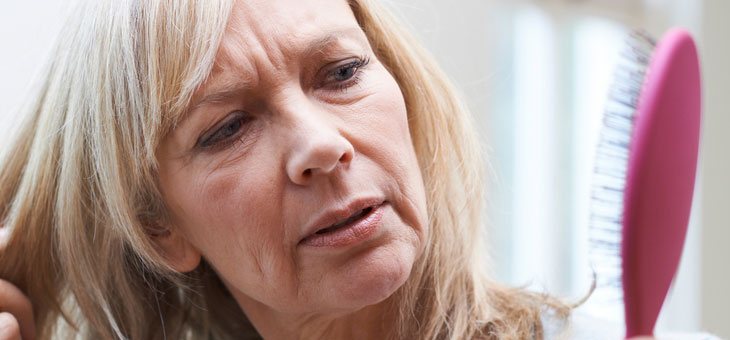There are so many possible reasons why our hair falls out or – at very least – thins out, that it’s surprising we have any in the first place.
For example, if your diet doesn’t have enough protein, or if you’re iron deficient, hair can fall out or not regenerate. Hair needs iron to remain healthy, while a body low in protein looks to counterbalance things, and reducing hair growth is one way.
People who suffer from anorexia or bulimia are especially vulnerable because their bodies are simply not getting the necessary nutrients.
But there’s more.
Starting forms of birth control can cause hair loss, as can coming off them, while pregnant women may experience thickened hair as hormones shift, but will lose that hair after giving birth.
Washing your hair too vigorously, drying it too hard with a towel or combing or brushing it when it’s wet can even put stress on hair. So can the overuse of hair dryers, curling and flattening devices, hair colourings and hairsprays.
It’s all enough to give you sleepless nights, but don’t get too stressed because too much stress also causes hair loss. Oh, and try not to worry yourself that illnesses, such as the simple flu, can cause hair loss, as can some of the medications you take to stay healthy.
If you’re taking blood thinners, some forms of acne medication or tablets for heart issues or high blood pressure, you may suffer some hair thinning. Ask your doctor about such side-effects.
And if all this drives you to take up smoking again: don’t, because cigarette smoke can upset hair follicles.
So, eat right, treat your hair carefully, don’t smoke and don’t get stressed, and then you’ll only have to contend with things more difficult to control, such as hormonal changes.
The advice here, again, is don’t stress. Hormonal hair loss can be temporary and a doctor may be able to offer advice.
It all sounds a bit hair-raising, and it would be, if we had more hair to raise. As for buying the best wigs, we’ll save that for another day.
So in a nutshell, what can you do?
-
- pack more protein into your diet by eating more meat, eggs, fish, nuts, seeds, and beans
-
- ask your doctor to check whether your iron and zinc levels are low and whether any medications are causing hair loss
-
- while you’re there, make sure you don’t have one of the more than 30 diseases that cause hair loss, including ringworm on your scalp, a thyroid disorder or an autoimmune disease
-
- treat your hair gently when washing, drying and styling
-
- don’t smoke and don’t stress.
Have you ever suffered from hair loss? Did you find the reason why?
Related articles:
Hair loss in women
How much hair loss is normal?
What your hair says about you

